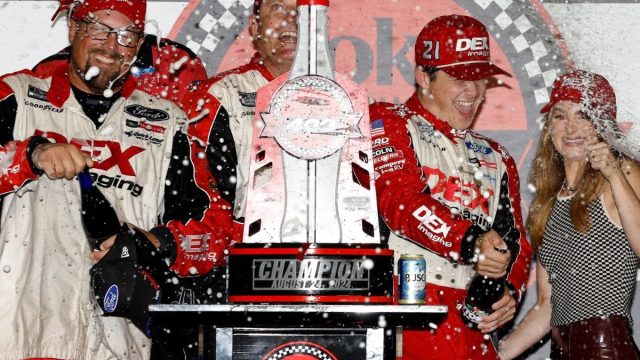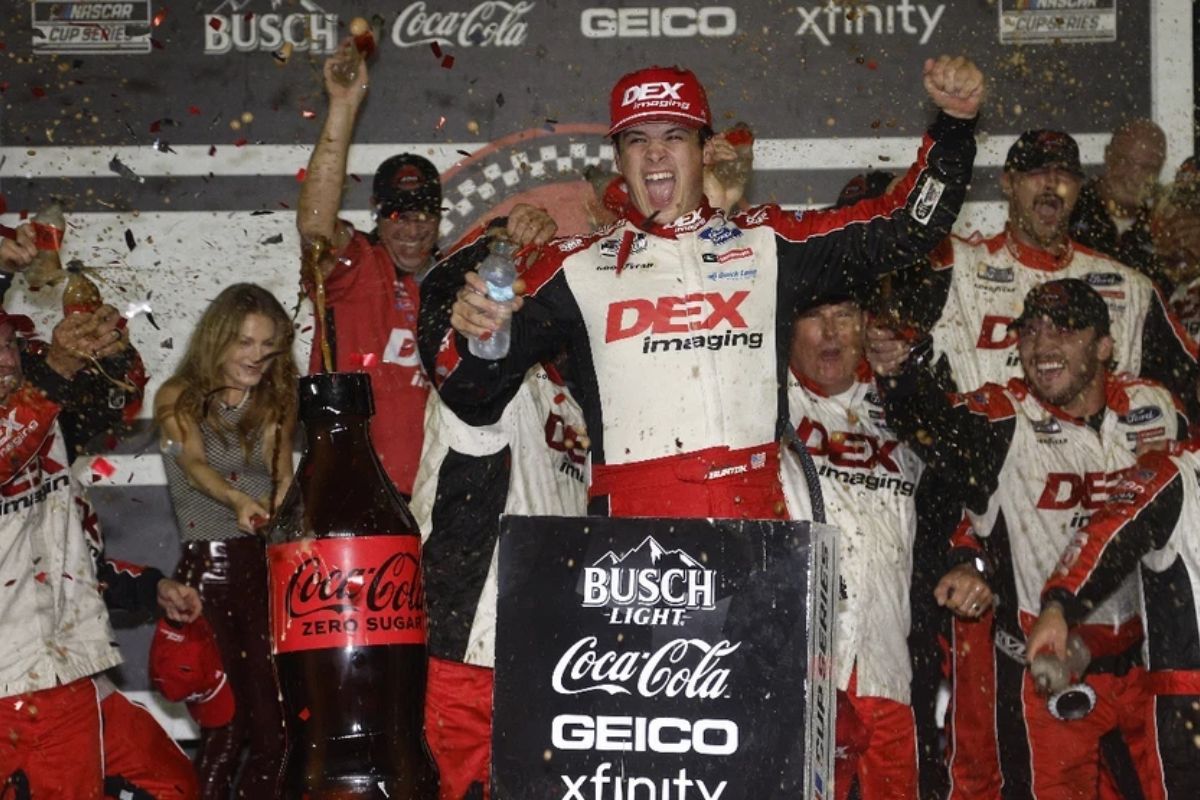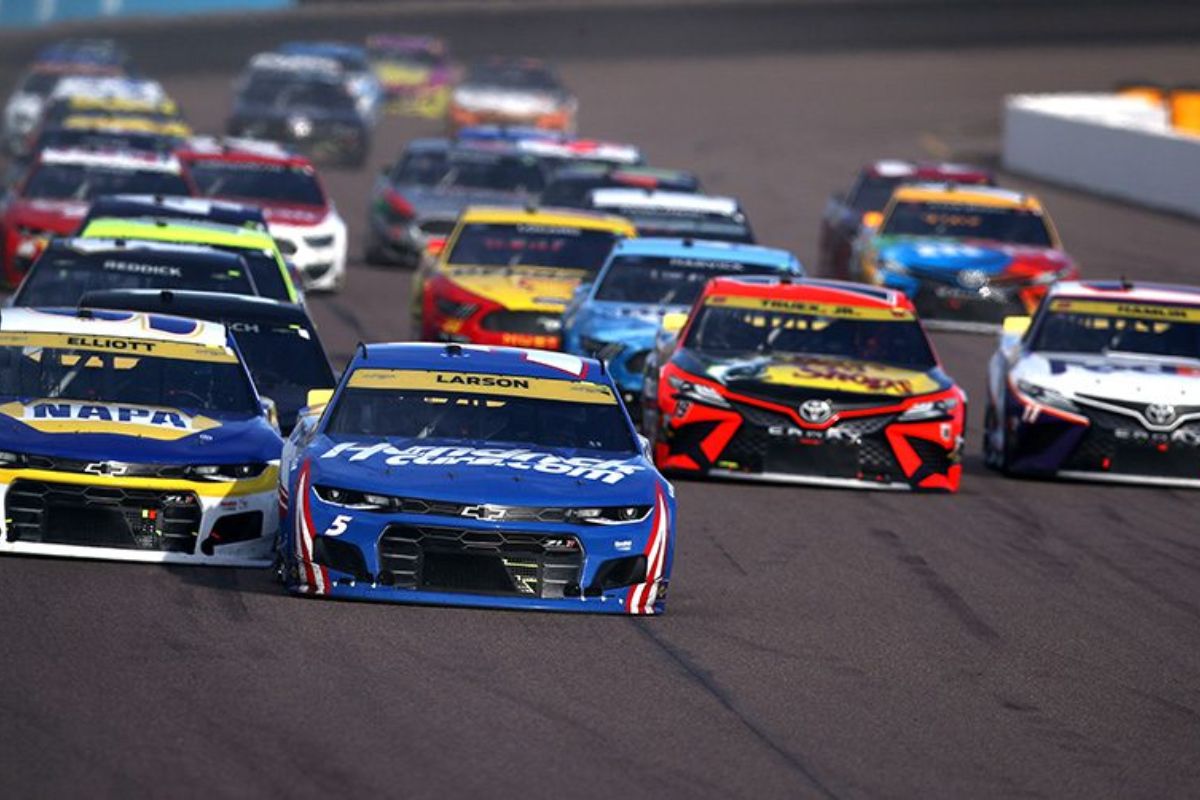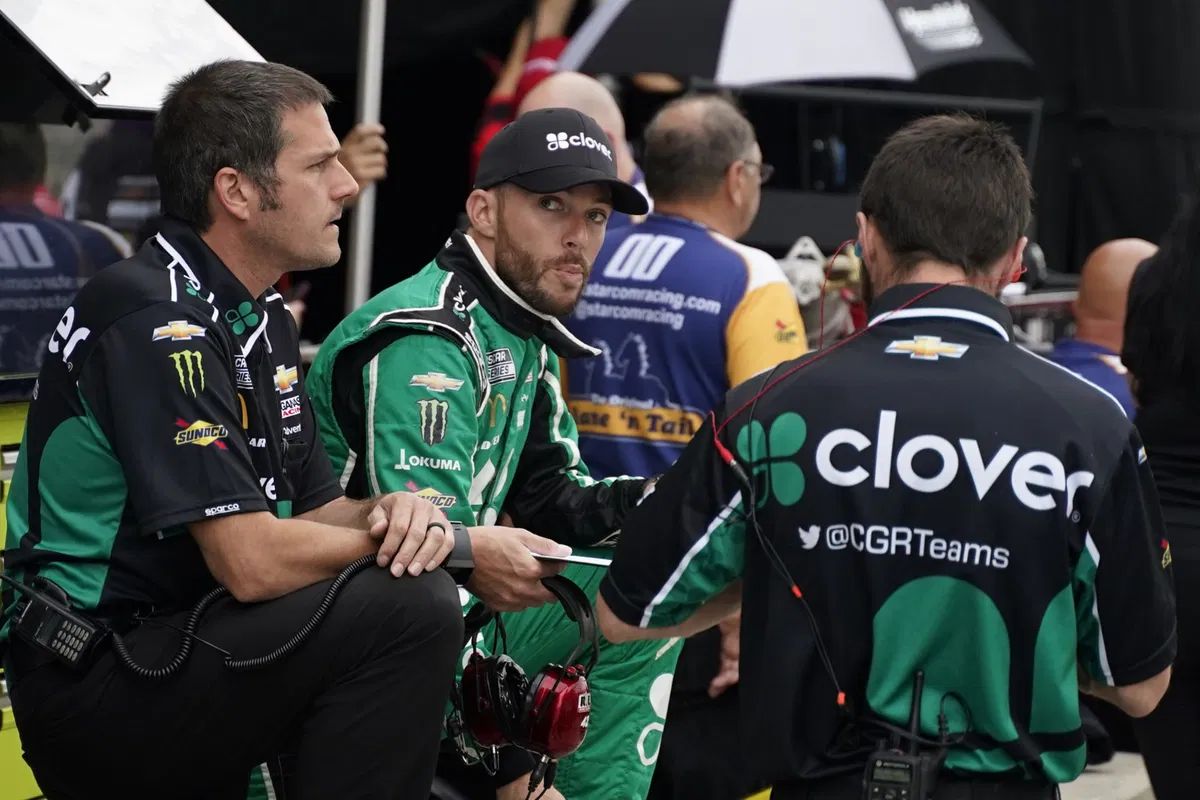Harrison Burton’s Win Fuels NASCAR Playoff Debate: Harrison Burton‘s unexpected victory at Daytona has ignited a critical conversation surrounding the integrity of NASCAR’s playoff system, which appears increasingly vulnerable to the whims of chance rather than consistent performance. While his win secures a playoff berth, it simultaneously casts a shadow on the meritocratic ideals the sport purports to uphold. This paradox raises vital questions about the implications of a system that allows less competitive drivers to disrupt the standings, suggesting a potential need for reform. As the dust settles, what might be the ramifications for both contenders and the sport’s future?
Key Highlights
- Harrison Burton’s victory at Daytona raises questions about NASCAR’s playoff system’s fairness, favoring luck over consistent performance.
- The “win and you’re in” format allows less competitive teams to disrupt the playoffs, undermining deserving drivers’ achievements.
- Burton’s rise to playoff contention despite a poor season highlights the flaws in the current qualification criteria for NASCAR.
- Ross Chastain’s struggles illustrate the volatility of the playoff system, where recent performances can drastically affect championship aspirations.
- The Daytona win could lead to a reevaluation of NASCAR’s points system and race formats to improve competitiveness and fairness.
Harrison Burton’s Surprise Victory
Harrison Burton’s unexpected victory at the Coke Zero Sugar 400 marks a significant turning point in his nascent NASCAR Cup Series career. Claiming his initial Cup win in the face of formidable competition highlights not only his potential but also the inherent contradictions within NASCAR’s playoff system. Jeff Burton’s assertion that the racing landscape is “shark-infested waters” aptly encapsulates the reality that seasoned drivers, with more consistent performances throughout the season, could be sidelined by a single race result, such as Burton’s success.
Despite a season characterized by subpar performance, Harrison’s victory serves as an indication of the unpredictable nature of motorsport. This win provides him with an invaluable opportunity to capitalize on a playoff berth, a scenario that highlights a critical flaw within NASCAR’s structure. The playoff system, introduced in 2014, allows for underperforming drivers to secure advancement based solely on isolated victories, potentially excluding more deserving contenders.
Burton’s success at Daytona, while commendable, raises crucial questions about meritocracy in the sport. It suggests a paradigm shift where sheer luck or a favorable race can eclipse consistent excellence.
As NASCAR continues to evolve, the implications of such a victory could resonate throughout the season, challenging the integrity of competitive balance. While Harrison Burton’s win is a personal milestone, it simultaneously illuminates a pressing concern within NASCAR that warrants deeper scrutiny and discussion among stakeholders and fans similarly.
Harrison Burton’s Playoff Impact
The dramatic shift in playoff standings following Harrison Burton’s victory at the Coke Zero Sugar 400 emphasizes the complexity of NASCAR’s competitive framework. From 34th to 16th in points, Burton’s meteoric rise exemplifies the unpredictable nature of stock car racing, where a single success can dramatically reshape the postseason landscape.
Prior to this crucial win, Burton’s season had been characterized by a lackluster performance, with few top-ten finishes and a string of disappointing results.
Burton’s victory not only secured him a playoff spot but also sparked a debate regarding his legitimacy as a competitor. As NASCAR insider Eric Estepp pointed out, the focus should remain on the significance of Burton’s maiden victory rather than the chaotic reorganization of the playoff picture it triggered.
“A beautiful moment, an emotional moment…for so many in the sport. Wood Brothers get number 100, Dex Imaging gets all that good publicity, all the Victory Lane photos, do the hat dance…Why can’t that be the moment? Why does this moment now have to impact the next 11 weeks of the season…who’s going to make it to the championship at Phoenix?” – Estepp
This raises critical questions about the efficacy of a system that allows a driver with limited success to leapfrog into playoff rivalry simply through a singular performance at a superspeedway.
While Burton’s win highlights the potential for underdog stories in NASCAR, it also emphasizes a fundamental flaw in the playoff structure. Stronger competitors, having illustrated consistent performance throughout the season, now face the challenge of competing against a driver who may not possess the same level of skill over the long haul.
Criticism of NASCAR’s Playoff System
Recent discussions surrounding Harrison Burton’s unexpected playoff entry have reignited scrutiny of NASCAR’s playoff system, particularly the “win and you’re in” format. This approach, while thrilling in its immediacy, raises considerable questions about fairness and the integrity of competition in the sport. Critics argue that a single victory, such as Burton’s at Daytona, should not overshadow a season’s worth of performance metrics.
“Let’s be honest – Harrison Burton won tonight, a legitimate winner – he’s in the playoffs. But is Harrison Burton a playoff driver, or is the Wood Brothers a playoff team? No. They’ve been outside the top 30 in points all year…for the better part of 3 years. They are going to knock out a Chris Buescher or a Ross Chastain. While neither of those drivers has been particularly great this year, they both could realistically figure it out and at least make it to the round of 8.” – Estepp
Key criticisms of the current playoff structure include:
- Disparity in Performance: Teams like Burton’s Wood Brothers, who have struggled for years, can suddenly disrupt the playoff landscape despite being outside the top 30 in points.
- Erosion of Meritocracy: The playoff system rewards occasional wins over consistent performance, potentially sidelining more deserving contenders like Chris Buescher or Ross Chastain.
- Impact on Team Dynamics: A win for a less competitive team can displace stronger teams, undermining the competitive balance that is crucial to the sport.
- Diminished Stakes: The focus on individual race victories can diminish the importance of regular-season standings, altering team strategies and fan engagement.
As the season progresses, the discussion will likely intensify, prompting NASCAR to reconsider whether this formula truly serves the sport’s best interests.
Ross Chastain’s Playoff Struggles
Ross Chastain’s playoff aspirations have taken a considerable hit this season, reflecting the unpredictable nature of NASCAR’s competitive landscape. Once a contender with a clear path toward postseason success, Chastain’s recent performances have been anything but stellar. Following a promising start, where he held 9th place in points after New Hampshire, a disheartening streak of six consecutive finishes outside the top ten has drastically weakened his position.
This downturn has left him grappling with the consequences of inconsistent performance, especially as he competes with fellow drivers like Bubba Wallace for the final playoff spot. The situation has been exacerbated by the emergence of new contenders; Harrison Burton’s unexpected victory at Daytona marked a crucial moment, sealing Chastain’s fate as he slipped to 27 points below the playoff cutline.
Chastain’s struggles highlight a broader concern regarding the volatility inherent in NASCAR’s playoff system. The intense stakes and fierce competition can swiftly alter a driver’s fortunes, as evidenced by Chastain’s rapid descent from playoff certainty to an uphill battle for survival.
His experience serves as a reminder of the fine margins that define success in this sport and the precarious nature of championship aspirations. As the season progresses, the question remains: can Chastain reclaim his momentum and secure a place among the playoff elite?
Chastain’s Hopes and the Upcoming Southern 500
Amidst the swirling uncertainties of the NASCAR season, Chastain finds himself at a crucial crossroads as he prepares for the upcoming Southern 500. After enduring the chaotic aftermath of the ‘Big One’ at Daytona, where he salvaged a 12th-place finish despite considerable challenges, he now faces the intimidating challenge of improving his playoff positioning.
“I was just hoping it would stay running, keep the water in it and be able to keep up with the pack. Looking at the car, it was amazing it did.” – Chastain
With a scant two top-tens at Darlington, Chastain’s playoff hopes hinge on his performance in this critical race.
As he turns his focus to the Southern 500, Chastain identifies key strategies that could enhance his chances:
- Consistent Performance: Prioritizing a steady run throughout the race to optimize stage points.
- Adaptability: Adjusting to the track conditions and unexpected race dynamics that often characterize the Southern 500.
- Aggressive Strategy: Implementing bold moves when necessary, particularly in crucial moments of the race.
- Team Communication: Maintaining clear dialogue with his pit crew for ideal strategy execution during pit stops.
Chastain’s optimism is palpable as he states, “I look at it like we have another chance to go win the Southern 500.”
“I look at it like we have another chance to go win the Southern 500. That’s what I’m focused on this week. The points, they give them out at the stages and end of the race. If you run good, they give you a lot of them.” – Chastain
This mindset reflects a deeper understanding of the sport’s complexities; success at Darlington could not only reinvigorate his playoff aspirations but could also redefine his path for the remainder of the season.
News in Brief: Harrison Burton’s Win Fuels NASCAR Playoff Debate
Harrison Burton’s unexpected victory at Daytona highlights inherent flaws within NASCAR’s playoff system, where luck can eclipse consistent performance. This event not only raises questions about the meritocracy of the sport but also invites scrutiny of the “win and you’re in” format, allowing less competitive drivers to disrupt the standings. As the legitimacy of deserving contenders is called into question, a compelling case emerges for reform in NASCAR’s qualification criteria to guarantee a more equitable and competitive racing environment.
ALSO READ: Harrison Burton Wins First Cup Race at Daytona, Securing Wood Brothers’ 100th Victory



